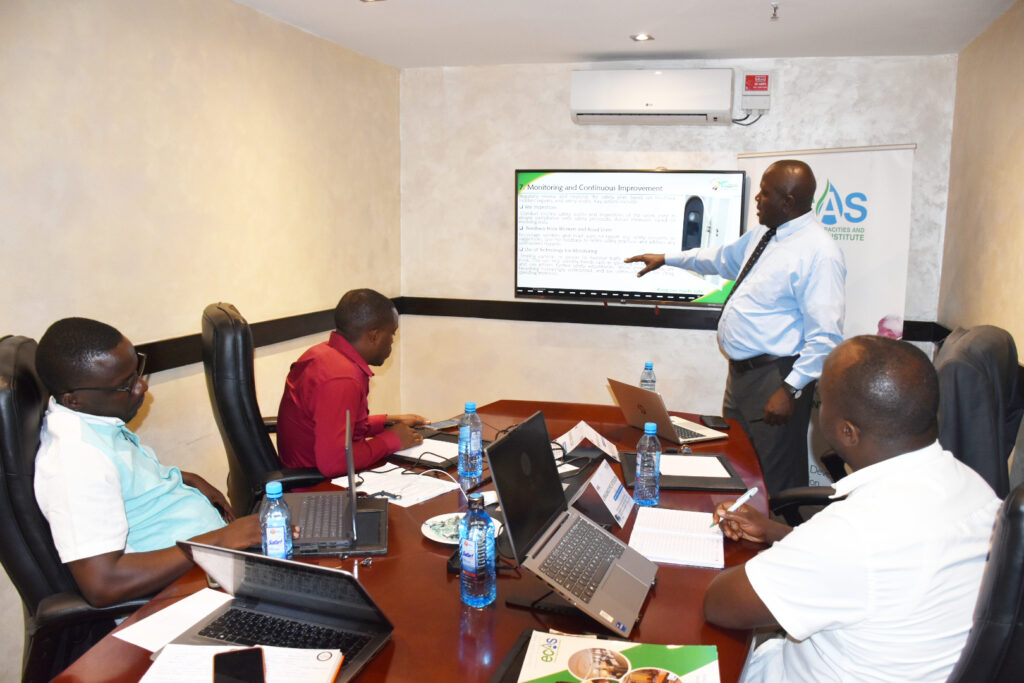
CONCEPT NOTE
INTERNATIONAL TRAINING ON FOREST ADAPTATION PLANNING AND PRACTICES
COURSE BACKGROUND
Forests play a critical role in climate adaptation and mitigation, serving as carbon sinks, biodiversity hotspots, and natural buffers against extreme weather events. However, climate change is increasing risks such as wildfires, pest infestations, shifting ecosystems, droughts, and deforestation, threatening forest health and the livelihoods of millions who depend on them. Without effective adaptation strategies, forest degradation can accelerate climate vulnerabilities, biodiversity loss, and socio-economic instability in forest-dependent communities.
The Environmental Capacities and Sustainability (ECAS) Institute has developed this course to equip professionals with practical skills and knowledge to enhance forest resilience and adaptation planning in response to climate change. The course explores scientific approaches, policy frameworks, nature-based solutions, and sustainable forest management practices that strengthen ecosystem services and community resilience.
This training focuses on integrating climate adaptation into forest governance, policy, and land-use planning. Participants will gain expertise in climate risk assessment for forests, ecosystem-based adaptation, afforestation and reforestation strategies, carbon sequestration, and sustainable resource management. Additionally, the course will cover climate finance opportunities, enabling stakeholders to access funding for forest adaptation projects.
By the end of this course, participants will have a comprehensive understanding of climate-smart forestry practices and will be equipped to develop adaptation action plans that ensure sustainable forest conservation and community resilience
COURSE OBJECTIVES OF THE TRAINING
By the end of the course, participants will be able to:
- Understand the impacts of climate change on forest ecosystems and forest-dependent communities.
- Assess vulnerabilities and risks related to wildfires, droughts, pests, and biodiversity shifts in forests.
- Develop and implement adaptation strategies for climate-resilient forest management.
- Apply nature-based solutions (NbS) such as afforestation, reforestation, and ecosystem restoration.
- Strengthen governance and policy frameworks to integrate climate adaptation into forest management.
- Utilize monitoring and early warning systems for forest health and disaster preparedness.
- Access climate finance and investment opportunities for forest adaptation initiatives.
- Engage local communities and indigenous groups in sustainable forestry and climate adaptation planning.
WHAT YOU WILL LEARN
Participants will gain technical expertise, policy insights, and hands-on skills in forest adaptation planning and sustainable management. Key learning areas include:
- Climate Change and Forest Ecosystems – Understanding climate-related threats such as temperature shifts, droughts, wildfires, and invasive species.
- Forest Risk and Vulnerability Assessments – Tools and methodologies for evaluating climate risks to forests.
- Sustainable Forest Management Practices – Strategies for reducing deforestation, enhancing carbon sequestration, and promoting biodiversity conservation.
- Nature-Based Solutions for Forest Adaptation – Implementing afforestation, reforestation, and agroforestry as adaptation measures.
- Forest Policy and Governance – Strengthening legal frameworks for climate-smart forest management.
- Community-Based Adaptation in Forestry – Engaging indigenous peoples and local communities in forest conservation.
- Climate Finance for Forest Adaptation – Identifying funding sources for forest-related climate initiatives.
- Monitoring, Evaluation, and Early Warning Systems – Using technology for adaptive forest management and disaster risk reduction.
DURATION AND PROGRAM
TARGET PARTICIPANTS
This course is designed for forest managers, policymakers, environmental professionals, conservationists, climate adaptation specialists, researchers, and community leaders engaged in forest governance and climate resilience. It is also relevant for NGOs, private sector professionals, and international development practitioners working on sustainable forestry, biodiversity conservation, and climate change adaptation
TRAINING MODULES
| No | Module | Details | |
| 1. | Climate Change and Forest Ecosystems |
|
|
| 2. | Forest Risk and Vulnerability Assessments |
|
|
| 3. | Sustainable Forest Management (SFM) for Climate Adaptation |
|
|
| 4. | Nature-Based Solutions for Forest Resilience |
|
|
|
5.
|
Forest Policy and Governance for Climate Adaptation |
|
|
| 6. | Community-Based Adaptation and Indigenous Knowledge |
|
|
| 7. | Climate Finance for Forest Adaptation |
|
|
| 8. | Monitoring, Evaluation, and Early Warning Systems |
|
|
TRAINING STYLE
The course adopts a blended learning approach, integrating theoretical knowledge with hands-on training to ensure participants acquire both scientific insights and practical skills for forest adaptation planning.
Training sessions will include expert-led lectures, case studies, and interactive group discussions to explore real-world challenges and solutions. Participants will engage in practical exercises, GIS-based risk assessments, policy simulations, and scenario planning, allowing them to apply concepts directly to their work. Field visits (where possible) and virtual simulations will provide insights into forest adaptation interventions in action.
Additionally, the course will feature peer learning, experience-sharing sessions, and networking opportunities, encouraging participants to exchange best practices and strategies from different regions. By the end of the training, participants will be equipped with actionable adaptation plans and policy recommendations tailored to their respective contexts, ensuring the long-term resilience of forest ecosystems and forest-dependent communities.
9. GENERAL NOTES
- Training manuals and additional reference materials are provided to the participants.
- Upon successful completion of this course, participants will be issued with a certificate.
- We can also do this as a tailor-made course to meet organization-wide needs. Contact us to find out more: info@ecasiafrica.org.
- Payment should be sent to our bank account before the start of training and proof of payment sent to: info@ecasiafrica.org.
ABOUT ECAS INSTITUTE
The ECAS Institute designs and delivers independent and targeted training, research, and consulting services. Our work focusses on climate change and resilience building, carbon markets, renewable energy, nature-based solution, biodiversity conservation, agriculture and food systems, We are located in Nairobi Kenya and work across the African region. We have implemented training and research assignments in Kenya, Tanzania, Uganda, South Sudan, Somalia, Malawi, Rwanda, Congo, and South Africa. Globally, we have supported our partners from the UK, Denmark, Italy, Sweden, Germany, and USA.

